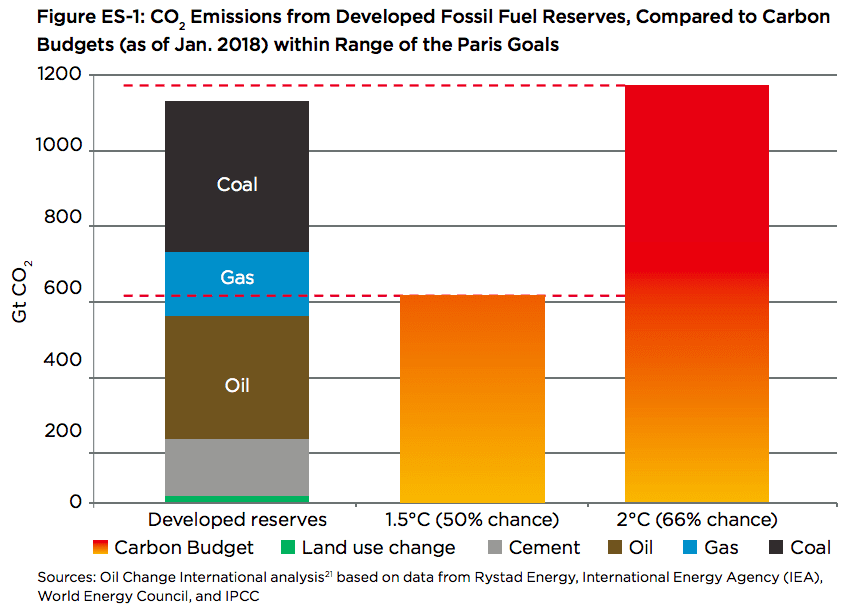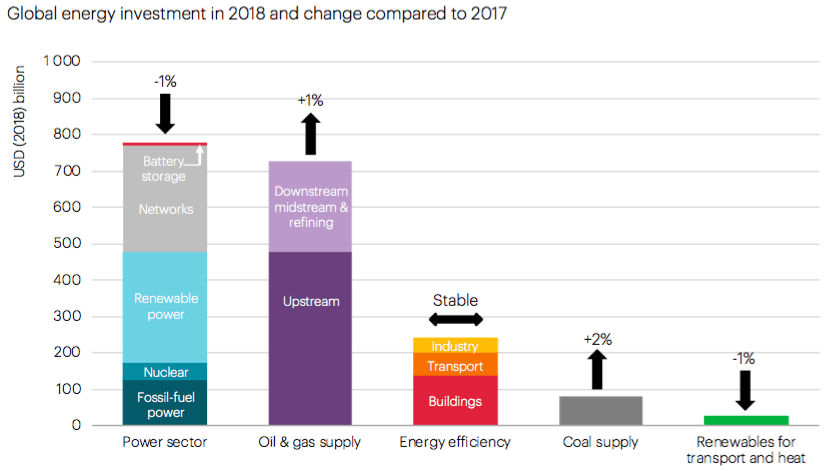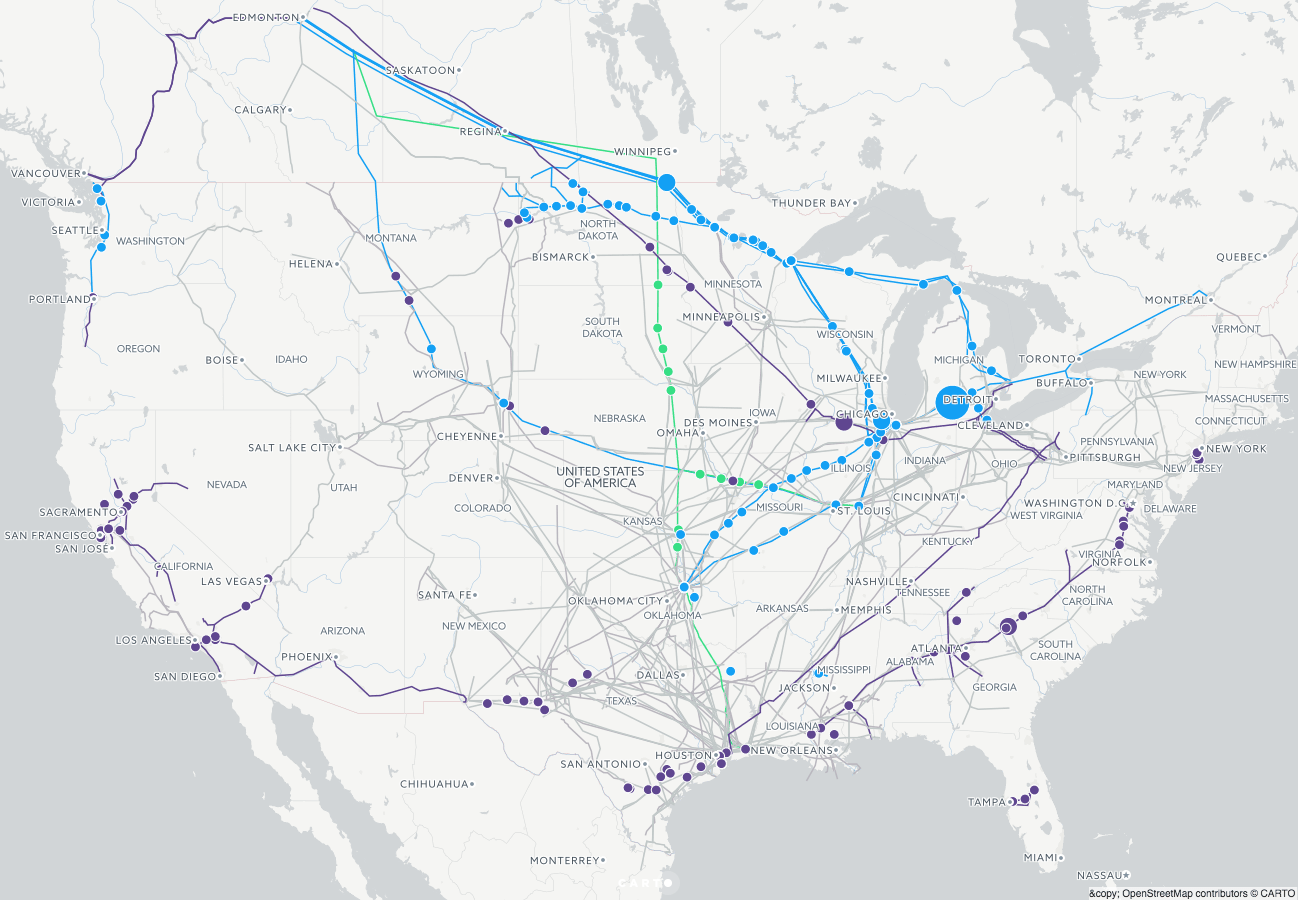As Climate Change Continues to Increase Due to Unsustainable Consumption of Fossil Fuels
Fossil fuel corporations are profiting from the continued consumption of coal, oil and gas, which are driving global warming to dangerous levels, but the industry's bad behavior doesn't stop with greenhouse gas emissions. Here are 8 reasons why we need a fossil fuel phase out.
Fossil fuel corporations are profiting from the continued consumption of coal, oil and gas, which are driving global warming to dangerous levels. A Greenpeace report illustrated the need for managed phase out of fossil fuel production as part of any comprehensive climate policy effort like a Green New Deal. The report shows that without specific policies to constrain fossil fuel supply, then a significant fraction of emissions reductions achieved by policies to reduce demand for fossil fuels could be wiped out.[1]
But the fossil fuel industry's bad behavior doesn't stop with greenhouse gas emissions. Fossil fuel companies are also responsible for significant air and water pollution. The burden of this pollution is borne most heavily by low-income and communities of color — and by the industry's own workers. Fossil fuel companies have also misled the public about the impacts of climate change, corrupted our democracy, and attacked renewable energy solutions.
Here are eight reasons why we should kick off a managed decline of the fossil fuel industry.
1. Fossil fuel companies are wrecking our climate
The science is clear: we cannot continue burning coal, oil, and gas if we are going to avoid the worst impacts of the climate crisis. We need to take transformative action in the next decade to completely phase out fossil fuel production and transition our economy to 100% renewable energy.
If we are able to limit global warming to 1.5°C (2.7°F) above pre-industrial levels, we will reduce the risk of extreme heat waves, heavy precipitation, droughts, sea-level rise, polar melting, expanding health risks, and other dangerous climate impacts worldwide.2] Here in the U.S., the climate crisis is already worsening "existing vulnerabilities in communities" and presenting "growing challenges to human health and safety, quality of life, and the rate of economic growth."[3] Studies have shown if nothing is done to halt emissions, climate change could cost the U.S. $500 billion every year by 2090.[4]
To successfully limit warming to 1.5°C, we must take dramatic action over the next decade. Globally, we must cut planet-warming greenhouse gas pollution "by about 45% from 2010 levels by 2030," and reach net-zero emissions by 2050.[5] Due to our responsibility for a large portion of historical emissions, the U.S. can and should reduce our emissions at an even faster pace.[6]
Every new ton of greenhouse gas emissions pushes global temperatures closer to the 1.5°C limit, and the amount of carbon we can emit without going over that limit is referred to as our "carbon budget." At current rates of emissions, the remaining budget will be exhausted in only 12-15 years.[7] Yet fossil fuel corporations have discovered roughly five times more oil, gas, and coal reserves than we can afford to burn and still limit warming to 1.5°C. Already, the amount of carbon found in fossil fuel production projects currently moving forward (known as "developed reserves") is more than enough to warm the planet to dangerous levels.[8]

CO2 Emissions from Developed Fossil Fuel Reserves, Compared to Carbon Budgets (as of Jan. 2018) within range of the Paris Goals. (Source: Muttitt 2016. Oil Change.)
Those reserves also represent billions of dollars in profits for fossil fuel executives and shareholders. As continued burning of coal, oil, and gas drives us toward planetary disaster, fossil fuel companies are recklessly digging us into a deeper hole by expanding investments in fossil fuel extraction, rather than the fossil fuel phase out that workers and communities at the frontlines of the climate emergency desperately need.
2. Fossil fuel companies are spending to lock-in climate pollution
Despite the urgent warnings from climate scientists, billions of investment dollars continue to flow to dirty energy companies. Total global investment in energy added up to $1.8 trillion in 2018, of which 35% (~$630 billion) went towards low-carbon energy, and the remainder (~$1.2 trillion) went to fossil fuels.[9] One out of every 10 energy dollars (roughly $170 billion in 2018) goes to fossil fuel supply projects in the U.S. alone, driving the rapid increase in U.S. oil and gas production in recent years.

Global energy investment in 2018 and change compared to 2017. (Source: IEA, World Energy Investment 2019)
Achieving the 1.5°C target will require a radical reallocation of capital from fossil energy to low-carbon solutions.[10] Unfortunately low-carbon investment has "stalled in recent years and needs a rapid boost to keep [our climate goals] in sight."[11] On the other hand, oil and gas companies are forecast to spend $4.9 trillion in capital expenditures on new oil and gas projects over the next decade — investments which could lock-in emissions that break the carbon budget and push global warming beyond 1.5°C.[12]
3. Fossil fuel companies cause deadly air pollution
In addition to releasing planet-warming greenhouse gas emissions, burning fossil fuels also generates localized air pollutants — such as soot (fine particulate matter, or PM2.5) and smog (ozone) — that increase the risk of death from stroke, heart disease, lung cancer, and respiratory illness among those exposed. Air pollution from fossil fuel production and consumption disproportionately affects communities of color and low-income — clearly perpetuating environmental injustices.[13] The World Health Organization estimates that ambient exposure to PM2.5 leads to around 4 million deaths worldwide every year (not counting exposure from indoor air pollution).[14] In the U.S., clean air rules have reduced this public health threat over time,[15] but tens of thousands of Americans still die every year from air pollution.[16] Trump's attempted rollback of clean air protections could lead to 80,000 additional deaths every decade.[17] Studies have shown that a "rapid phaseout of fossil-fuel-related emissions" could "save millions of lives."[18]
4. Fossil fuel companies cause water pollution
Time and time again, oil spills and explosions have wreaked havoc on water, land, and homes and communities. Major incidents — such as BP's Deepwater Horizon catastrophe, which spilled 4.9 million barrels of oil into the Gulf of Mexico,[19] or Enbridge's massive tar sands spill into the Kalamazoo River[20] — show that there is no failsafe way to extract, process, or transport fossil fuels. Where there is drilling, there is inevitably spilling,[21] and too often, these disasters have put marginalized communities under threat. In the last several years, an Indigenous-led movement of water protectors and allies has risen up to oppose risky, climate-wrecking pipeline projects across the country such as Dakota Access, Keystone XL, and the Line 3 expansion. Additionally, the oil and gas boom has put groundwater at risk from wastewater contamination[22] and has consumed scarce water resources.[23] Coal too can contaminate water resources during the mining process and via unregulated coal ash impoundments.[24]

Map of 373 U.S. hazardous liquids pipelines spills from 2010 to present for TransCanada (green), Kinder Morgan (purple) and Enbridge (blue). Available online at greenpeace.carto.com. Data: PHMSA & EIA.
5. Fossil fuel companies perpetuate environmental injustice
The burdens of both climate change and conventional pollution fall more heavily on low-income communities and communities of color. Numerous studies have shown that toxic waste sites are more likely to be found in vulnerable communities[25] and the same is true of coal fired power plants.[26] Race and poverty also predict higher exposure to harmful PM2.5 air pollution.[27] Climate change will also have a highly unequal impact across the world. A recent U.N. study found that climate change could "push more than 120 million more people into poverty by 2030 and will have the most severe impact in poor countries, regions, and the places poor people live and work."[28]
6. Fossil fuel companies don't treat workers fairly
Workers in these industries have often not received fair treatment either. Occupational data show that the upstream oil and gas industry has "one of the highest rates of severe injuries in the country,"[29] and after years of decline, black lung disease has made a comeback and is now afflicting Appalachian coal miners "earlier and in a more deadly form than ever before."[30]
As the coal industry has gone into long-term decline, workers have found that promises made by their corporate bosses have not been kept. In Appalachia, recent years have shown that "as [coal] companies declare bankruptcy, executives get healthy bonuses, polluted coal mines are abandoned, and miners and retirees are denied long-promised health benefits and pensions."[31] With the recent abrupt closure of two coal mines in Wyoming, the same pattern appears to be playing out there as well. This is why a just transition must be put in place to ensure that workers and communities are left better off as we phase out fossil fuel production.[32]
7. Fossil fuel companies have misled the public about the climate threat
Fossil corporations have known about the scale of the climate threat for decades, but far from warning the public, they spent millions on a campaign to sow doubt and disinformation, leading to decades of delay. Journalists have uncovered documents indicating that industry leaders were funding research into atmospheric CO2 as early as the 1950s and produced a 1968 report to the American Petroleum Institute that starkly warned of the threat of rising temperatures due to carbon pollution.[33] In the late 70s and early 80s, Exxon was funding cutting-edge climate change science,[34] but by the 1990s the company had pivoted to publishing misleading op-eds[35] and funding a network of climate deniers that works to block meaningful climate action to this day.[36] In recent years, other fossil fuel interests, such as the Charles and David Koch, have continued to fund denial and delay.[37]
As a result of these actions, what could have been a manageable economic transition to 100% renewable energy has become an urgent planetary crisis, putting the lives of millions under threat while time runs short to solve the problem.
8. Fossil fuel companies are attacking solutions, while raking in tax breaks
Today, many fossil fuel companies are shifting away from blatant climate denial, claiming to accept the findings of climate science, and perhaps voicing weak support for inadequate policies.[38] When push comes to shove the industry opens its pocket book to defeat any policies that might impact their bottom line. The Koch network has taken aim at climate-friendly policies such as net metering for rooftop solar, and more recently, the tax credit for electric vehicles.[39] When strong climate initiatives made the ballots in Colorado and Washington in 2018, the industry spent millions to defeat them.[40] In July 2019, fossil fuel interests pushed through a bill in the Ohio legislature that bailed-out money-losing coal plants while gutting renewable energy and efficiency standards.[41]
The fossil fuel industry has spent[42] millions of dollars in lobbying[43] and campaign contributions[44] to block any concerted climate action at the federal and state level. So far, this decades-long investment in influencing our political system is paying off. The fossil fuel industry continues to receive around $20 billion in federal and state production subsidies every year,[45] and reaped billions in additional tax savings from Trump's 2017 tax cut legislation.[46]
It is clear that the current business model of the fossil fuel industry is putting all of us in harm's way, but in particular, low-income, Indigenous, and communities of color who are on the frontlines of pollution and climate chaos. Fossil fuel interests are still one of the main barriers to the passage of comprehensive climate policies in the U.S. It is time for the industry to face a reckoning.
References
- Donaghy, T. 2019. Real Climate Leadership: Why The Next President Must Prioritize A Fossil Fuel Phase Out. Greenpeace, June. [link]
- The Intergovernmental Panel on Climate Change (IPCC). 2018. Special Report: Global Warming of 1.5 ºC (SR15). Chapter 3: Impacts of 1.5°C global warming on natural and human systems. [link]
- U.S. Global Change Research Program. 2018. Fourth National Climate Assessment (NCA4). Volume II: Impacts, Risks, and Adaptation in the United States. [link]
- Martinich, J. & A. Crimmins. 2019. Climate damages and adaptation potential across diverse sectors of the United States. Nature Climate Change, 9:397–404. [link]
- IPCC. 2018. SR15. Chapter 2: Mitigation pathways compatible with 1.5°C in the context of sustainable development.
- Climate Action Tracker. Country Summary: USA. [link]
- Rogelj, J. & P. Forster. 2019. A new approach for understanding the remaining carbon budget. Carbon Brief, July 17. [link]
- Muttitt, G. 2016. The Sky's Limit: Why The Paris Climate Goals Require a Managed Decline of Fossil Fuel Production. Oil Change International, September. [link]
- International Energy Agency (IEA). World Energy Investment 2019 (WEI2019). [link]
- McCollum et al. 2018. Energy investment needs for fulfilling the Paris Agreement and achieving the Sustainable Development Goals. Nature Energy, 3:589–599. [link]
- WEI2019.
- Global Witness. 2019. Overexposed: How the IPCC's 1.5°C report demonstrates the risks of overinvestment in oil and gas. April 23. [link]
- Mikati et al. 2018. Disparities in Distribution of Particulate Matter Emission Sources by Race and Poverty Status. American Journal of Public Health, 108:480-485. [link]
- World Health Organization. 2018. 9 out of 10 people worldwide breathe polluted air, but more countries are taking action. May 2. [link]
- American Lung Association. 2019. State of the Air. [link]
- Zhang et al. 2018. Long-term trends in the ambient PM2.5- and O3-related mortality burdens in the United States under emission reductions from 1990 to 2010. Atmos. Chem. Phys, 18:1–14. [link]
- Cutler, D. & F. Dominici. 2018. A Breath of Bad Air: Cost of the Trump Environmental Agenda May Lead to 80 000 Extra Deaths per Decade. JAMA. 319(22):2261-2262. doi:10.1001/jama.2018.7351. [link]
- Lelieveld et al. 2019. Effects of fossil fuel and total anthropogenic emission removal on public health and climate. PNAS, 116(15):7192-7197. [link]
- Adams, A. 2015. Summary of Information concerning the Ecological and Economic Impacts of the BP Deepwater Horizon Oil Spill Disaster. Natural Resources Defence Council, June. [link]
- McGowan, E. & L. Song. 2012. The Dilbit Disaster: Inside The Biggest Oil Spill You've Never Heard Of, Part 1. InsideClimate News, June 26. [link]
- Donaghy, T. 2017. 4 Proposed Tar Sands Oil Pipelines Pose a Threat to Water Resources. Greenpeace, August. [link]
- King, P. 2018. A decade of fracking research: What have we learned? EnergyWire, July 11. [link]
- Ridlington, E., K. Norman & R. Richardson. 2016. Fracking by the Numbers: The Damage to Our Water, Land and Climate from a Decade of Dirty Drilling. Environment America, April. [link]
- Earthjustice. Coal Ash: Reports & Publications. [link]
- Bullard, R., P. Mohai, R. Saha & B. Wright. 2007. Toxic Wastes and Race at Twenty 1987-2007. United Church of Christ Justice & Witness Ministries, March. [link]
- Wilson, A. 2012. Coal Blooded: Putting Profits Before People. NAACP, April. [link]
- Mikati et al. 2018
- U.N. Special Rapporteur on extreme poverty and human rights. 2019. Climate change and poverty. June 25. United Nations Office of the High Commissioner for Human Rights. [link]
- Soraghan, M. 2017. Oil and gas industry leads in severe injuries. EnergyWire. May 2. [link]
- Wei-Haas, M. 2017. Why Black Lung Disease Is Deadlier Than Ever Before. Smithsonian, May 15. [link]
- Roberts, D. 2019. Coal left Appalachia devastated. Now it's doing the same to Wyoming. Vox, July 9. [link]
- Donaghy 2019.
- Center for International Environmental Law. Smoke and Fumes. [link]
- Banerjee, N, L. Song, & D. Hasmyer. 2015. Exxon: The Road Not Taken. InsideClimate News. [link]
- Supran, G. & N. Oreskes. 2017. Assessing ExxonMobil's climate change communications (1977–2014). Env. Res. Lett., 12 084019. [link]
- Exxon Secrets. ExxonMobil Climate Denial Funding 1998-2014. [link]
- Greenpeace USA. Exposing Climate Deniers. [link]
- Hulac, B. & K. Brugger. 2018. How much is Big Oil working to pass a carbon tax? We checked. ClimateWire, September 26. [link]
- Negin, E. 2018. Will Koch Pull the Plug on Electric Cars? Union of Concerned Scientists, December 5. [link]
- Roberts, D. 2018. Fossil fuel money crushed clean energy ballot initiatives across the country. Vox, November 11. [link]
- Roberts, D. 2019. Ohio just passed the worst energy bill of the 21st century. Vox, July 27. [link]
- InfluenceMap. 2019. Big Oil's Real Agenda on Climate Change. March. [link]
- Brulle, R.J. 2018. The climate lobby: a sectoral analysis of lobbying spending on climate change in the USA, 2000 to 2016. Climatic Change, 149:289. https://doi.org/10.1007/s10584-018-2241-z [link]
- Open Secrets. Oil & Gas. [link]
- Redman, J. 2017. Dirty Energy Dominance. Oil Change International, October. [link]
- Juhasz, A. 2018. Inside the Tax Bill's $25 Billion Oil Company Bonanza. Pacific Standard, March 27. [link]
Originally published on September 3, 2019; revised on November 22, 2021.
atkinsonatted1946.blogspot.com
Source: https://www.greenpeace.org/usa/research/8-reasons-why-we-need-to-phase-out-the-fossil-fuel-industry/
0 Response to "As Climate Change Continues to Increase Due to Unsustainable Consumption of Fossil Fuels"
Post a Comment